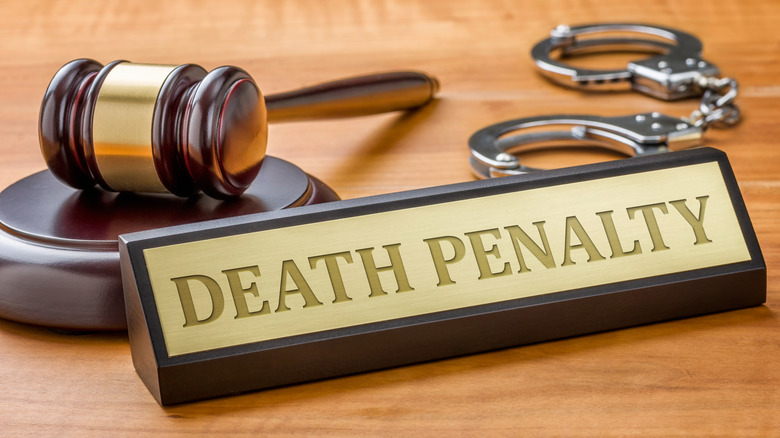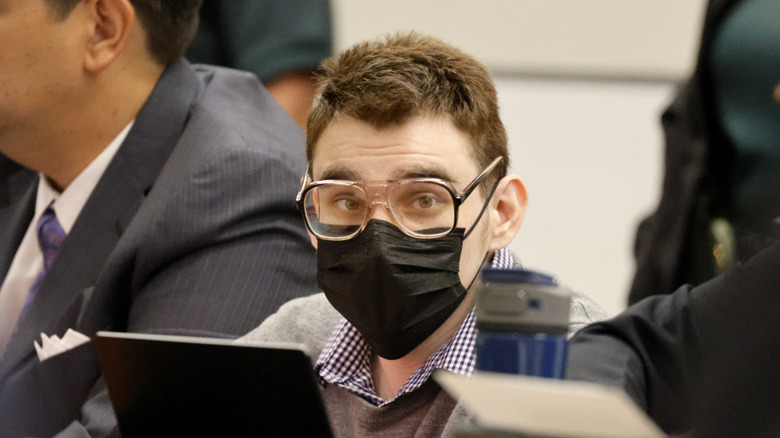What A Florida Jury Must Do In Order To Recommend The Death Penalty
On Valentine's Day in 2018, Nikolas Cruz opened fire at Marjory Stoneman Douglas High School in Parkland, Florida. History explains that the then 19-year-old was a former student that had been expelled for "disciplinary reasons." Armed with an AR-15, Cruz arrived at the school in an Uber and subsequently began shooting at students (per NPR). In four minutes he killed 14 students and three school employees. Additionally, he grievously injured 17 others. Cruz was later charged with 17 counts of murder. In October 2021, AP News reported that he pled guilty to each and every charge against him.
Now, Cruz is facing the death penalty. More than four years after the shooting, his sentencing trial is set to begin. The Guardian states that various factors have led to the trial's delay. This includes the COVID-19 pandemic as well as an intensive jury selection process. In Florida specifically, trials that involve a death sentence take two years, and in this case more, to commence. Cruz's defense team, however, is aiming for a life sentence without the possibility of parole. Nevertheless, his life is now in the hands of the selected jury. Seven men and five women will decide if Cruz will be executed for his crimes (via NPR).
The jury has to agree unanimously
WPTV states that Florida has been executing convicted criminals since the 1800s. Per the Florida Department of Corrections, as of July 19, 2022, there were 306 prisoners on Florida's death row. The BBC explains that in the Sunshine State, a death sentence is usually warranted in cases where murders are "especially heinous, atrocious or cruel" or are considered to be "cold, calculated," amongst other things. In Florida, the jury, not the judge, decides a prisoner's sentence. Usually, this is not the case — in other states, a jury will only decide if an individual is guilty or not. That being said, for someone to be sentenced to death in Florida, every member of the jury must be in favor of this decision.
Even if only one juror is against it, the prisoner will be handed a life sentence (via NPR). WPTV reported that previously, only a supermajority was needed to sentence an inmate to death in Florida. Simply put, if less than 10 jurors disagree with imposing the death sentence, the individual was sentenced to life. However, that changed in March 2017 when the Florida Supreme Court ruled that death sentences could only be enacted by a unanimous jury. Even so, the BBC writes that ultimately, the judge will decide to comply with the jury's decision or to sentence an inmate to life in prison.
Inmates can choose their method of execution
In Cruz's case, NPR explains that his defense team will maintain that his actions were a culmination of severe mental illness and an abusive household. In other words, they are going to contend that the now 23-year-old does not deserve the death penalty. In a different article by NPR, Stephen Harper, a Florida death penalty expert stated that "The prosecutor is going to argue that this was a totally evil, unnecessary and horrible act." Per the BBC, the prosecution is set to prove that Cruz's massacre was well-thought-out. Graphic videos, photos, and in-depth testimonies from survivors will be used to further persuade the jury to sentence Cruz to death row.
If Cruz is sentenced to death, The Marshall Project reports that Florida law dictates that he will be able to choose between death by lethal injection or by electric chair, though no one has been put to death by the electric chair in Florida since 1999, according to The Washington Post. In order to be executed, WPTV writes that the governor of Florida has to sign a death warrant. A prisoner will not be put to death until the governor chooses a date and time for the execution. In the meantime, those on Florida's death row can expect to spend the last days of their life in a cell that is 6 x 9 x 9.5 feet high (via the Florida Department of Corrections). The agency adds that the average age of execution is usually 44.9 years old.


